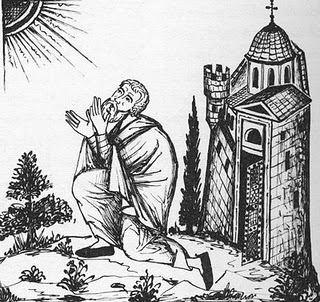On External Wisdom
 Excerpt from: Raising the Mind, Warming the Heart
Excerpt from: Raising the Mind, Warming the Heartby Father Seraphim Rose of Platina
If the authentic spirit of Orthodoxy is not transmitted to us like this, there is a temptation for us to be following "external wisdom," the wisdom of this world. We will then, in coming to Orthodoxy, go after external things: good icons, beautiful Church services according to the Typicon, just the right kind of chanting, tithing, having beautiful churches.... All these things are wonderful and good, but we can approach them without placing first a warm, Christian heart and a struggle with ourselves whereby we are made
humble. If we neglect this essential priority, then all these wonderful external things can, as the philosopher Vladimir Solovyev describes, be put in a museum of Orthodox antiquities—and the Antichrist will love this.
The Antichrist must be understood as a spiritual phenomenon. Why will everyone in the world want to bow down to him? Obviously it is because there is something in him which responds to something in us—that something being a lack of Christ in us. If we will bow down to him (God forbid that we do so!), it will be because we will feel an attraction to some kind of external thing, which might even look like Christianity, since "Antichrist" means the one who is "in place of Christ" or looks like Christ. In such a way we will entirely lose our salvation, going after he who is in place of Christ, and who will lead us away. The Antichrist can come, of course, only after the whole world has heard of Christ; therefore, the final choice is made between Christ and the Imposter, and almost the whole world will follow after the Beast.
How do we keep from doing this, from following "external wisdom"? We can be caught up in it, it should be noted, even if we become caught up in exalted ideas. It is in the fashion now to learn about the Jesus Prayer, to read the Philokalia, to go "back to the Fathers." These kinds of things also will not save us—they are external. They may be helpful if they are used rightly, but if they become your passion, the first thing you are after, then they become externals which lead not to Christ, but to Antichrist.
If you get all excited about having the right kind of icons and begin saying, "There's an icon of the wrong style in your church! " you must check yourself and be more careful, because you are again placing all your emphasis on something external. In fact, if there is a church with nothing but icons of the latest "approved" style, one might justifiably regard it with suspicion. There is a case (one of many) in which a church had old, original Russian icons—some good and some in rather poor taste, painted in a relatively new style—and a zealous person took them all out and put in new, "traditional" style paper icon prints. And what was the result? The people there lost contact with tradition, with the people who gave them Orthodoxy. I they removed the original icons which believers had prayed before for centuries.
An icon is first of all something to be prayed before. This was once affirmed by Archbishop John (Maximovitch) [glorified as a Saint in 1994 by the Russian Church Abroad—webmaster], who was the president of a San Francisco icon society dedicated to the restoration of old icons. One member, who was very zealous for the old icon style, wanted the Archbishop to make a decree in the diocese that only old style icons are to be allowed, or at least to make a decision that this was the officially approved position. In a way, this man's intention seemed good. Archbishop John, however, told him, "I can pray in front of one kind and I can pray in front of another kind of icon." The important thing is that we pray, not that we pride ourselves on having good icons.
So far we have been citing contemporary examples of "external wisdom" in Orthodoxy, but there are profitable illustrations of it in the past as well. One of these is found in the spiritual counsels of Abba Dorotheos, a 6th-century desert Father from Gaza. "I knew a man, " writes Dorotheos, "who came to a miserable state. From the beginning, if one of his brethren said anything to him, he used to say, 'Who is he? He is not Zosimas or one of his lot.' Then he began to cheapen them and to say, 'There is no one of any importance but Macarius,' and after a little while, to say, 'Who is Macarius, anyway? There is no one any good, except perhaps Basil or Gregory.' And then in a short while he began to debunk them, saying, Who is Basil? Who is Gregory? There is no one who counts but Peter and Paul.' And I said to him, 'Really, brother, you are going to despise these soon.' And believe me, after a short time he began saying, 'Who is Paul? Who is Peter? There is no one but the Holy Trinity!' And so at last he lifted himself up against God—and there he gave up!"
This monk ended as he did because he began with self-love in his heart and did not really want to change himself; he wanted to follow after some kind of external thing. We see this same attitude nowadays, expressed something like this: "Everybody knows St. Symeon the New Theologian. Oh, yes! We'll run after him. St. Gregory Palamas. Yes! Oh, he's all the rage! Yes! And all the hesychast Fathers.... Hesychasm! and Jesus Prayer," and other advanced subjects—all this is on an external level.

Comments